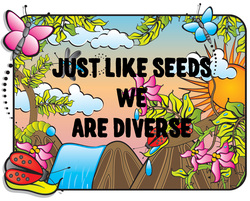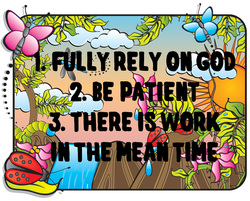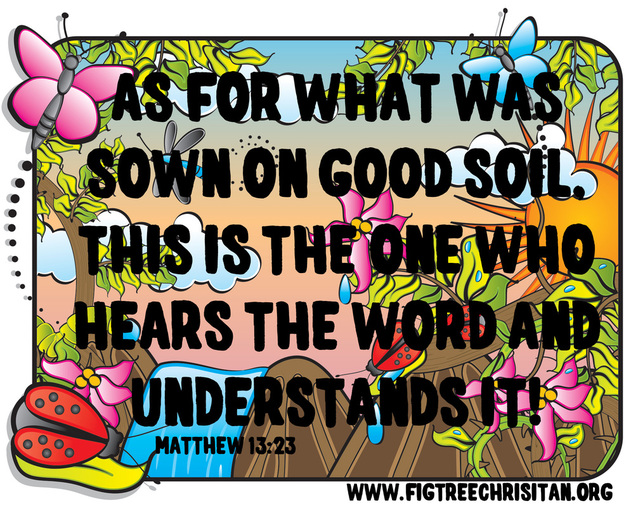|
Matthew 13:1-9,18-23 NRSV 1 That same day Jesus went out of the house and sat beside the sea. 2 Such great crowds gathered around him that he got into a boat and sat there, while the whole crowd stood on the beach. 3 And he told them many things in parables, saying: “Listen! A sower went out to sow. 4 And as he sowed, some seeds fell on the path, and the birds came and ate them up. 5 Other seeds fell on rocky ground, where they did not have much soil, and they sprang up quickly, since they had no depth of soil. 6 But when the sun rose, they were scorched; and since they had no root, they withered away.7 Other seeds fell among thorns, and the thorns grew up and choked them. 8 Other seeds fell on good soil and brought forth grain, some a hundredfold, some sixty, some thirty. 9 Let anyone with ears listen!” 18 “Hear then the parable of the sower. 19 When anyone hears the word of the kingdom and does not understand it, the evil one comes and snatches away what is sown in the heart; this is what was sown on the path. 20 As for what was sown on rocky ground, this is the one who hears the word and immediately receives it with joy; 21 yet such a person has no root, but endures only for a while, and when trouble or persecution arises on account of the word, that person immediately falls away. 22 As for what was sown among thorns, this is the one who hears the word, but the cares of the world and the lure of wealth choke the word, and it yields nothing. 23 But as for what was sown on good soil, this is the one who hears the word and understands it, who indeed bears fruit and yields, in one case a hundredfold, in another sixty, and in another thirty.” When I was about six or seven years old, my dad bought a watermelon from the grocery store. This was a very seedy watermelon, and every bite had at least two or three little black seeds to spit out on my plate. Looking at the seeds, I asked him, “Can we plant the seeds and grow our own watermelon?” Now, my dad loved to allow us to experiment and just try things out. His eyes lit up as he responded, “I think that's a great idea! We can plant them where the trees used to be.” When Dad purchased the house we were living in, we had two trees in the front yard. They both had become diseased and were cut down. The stumps were ground up and two mounds were left in their place. After we finished eating the watermelon, Dad took my sister and myself out front and we dug a whole on one of the mounds and buried the seeds. It only took a couple of days and a vine began to push through the ground. We were so excited. A few weeks prior I tried to hatch a grocery store egg. I had kept it in my room for about a week before my mom discovered it under my pillow. That's when Dad informed me grocery store eggs were sterile and would never hatch a baby chick. They carefully placed the egg in the trash. (No one wanted to know what an unrefrigerated, week old egg would smell like if it broke.) Part of me feared the watermelon seeds would be sterile too. I was overjoyed to discover they were not. Every day I went out to look at the vine. Little yellow flowers began to bloom. I learned each bloom was where a future watermelon would be. There were about 7-8 blooms. When the blooms fell off, little bulbs took their place. Baby watermelons. Then one day, I went outside to discover the watermelon vine was gone and the lawn was newly mowed. Come to find out, the neighbor earned $10 and mowed everything, including our plant. Dad forgot to tell the kid not to mow the mounds. I was devastated. Dad bought another watermelon and we tried again. Only, we were getting too close to the end of the watermelon season. Living in Kansas City, the summers are hot and the winters are cold. We only got cucumber sized watermelons before we had to give up. Dad, wanting to give us something, cut them up. Baby watermelons taste very similar to cucumber. In case you were wondering. Years later, we would be eating salsa and I would ask him if we could make our own salsa. We spent the summer growing tomatoes, peppers and onions. Then, after all that hard work of keeping the garden and pulling weeds, we made salsa and canned it. Best salsa ever. I just appreciate things better when it is made from scratch. I also have a new concept of what “scratch” means. I share these stories because they gave me perspective on seeds. The parable of the sower and the seeds tells the story of one kind of seed in many different kinds of soils. It is the seed that falls in the good soil that yields a fruitful crop. The seed was simplified to make a point, “for what was sown on good soil, this is the one who hears the word and understands it, who indeed bears fruit and yields, in one case a hundredfold, in another sixty, and in another thirty.” The one who hears the word and understands it...  Jesus simplified the parable so we were all the same kind of seed, but in actuality we are different, and how we get to the good soil differs as well. Let me explain it using seeds. Besides being physically buried by an animal or human, there are other ways seeds find their fertile ground. Some seeds are made to be carried. I remember when I lived on my grandmother's farm in Kansas, there were tons of burrs. They were nasty little seeds with little hooks all over it. If I spent an afternoon running around outside, I would come back in with tons of those little burrs attached to my socks and tennis shoes. These seeds find their fertile ground by being picked up by humans and animals. In the same way, some people find God by being physically taken there by someone else. I recall Elisha who found his call by being spiritually carried by Elijah. Some seeds are designed to be eaten and digested in order to find it's fertile ground. Fruit seeds, like the watermelon I mentioned earlier, create sweet fruit so animals will eat it up and create natural fertilizer for where ever they deposit the seed later. You know, through the natural processes eaten food goes through. In the same way, some people need to go through trials and tribulations to find God. When they get through the other side they take the dung left over and fertilize it to make something fruitful grow. Fruit seeds reminds me of Jonah, who needed to ride out some time in the belly of a big fish to find where God wanted him to be. Some seeds are meant to follow the wind. Have you ever seen maple tree seeds? They are sometimes called helicopter seeds because they have these wings that come off of it. They spin around while they drop to the ground, sometimes being caught by the wind and carried off. I also think of dandelions. When the flower dies it is replaced by those beautiful white puffs. I couldn't even tell you how many of those I blew all over my grandma's yard as a kid. More than I can count. Oh, those who can be carried by the spiritual winds. To completely trust in God's call as they let go and trust. They find fertile ground simply by letting go. I recall Jeremiah, a prophet in exile. He was blown from his land to a new place. His call was found in foreign soil. The truth of the matter is, how we get to that fertile ground takes many different forms. Sometimes it happens more than once. There are many of us who are uprooted and find ourselves taking more than one route to fertile ground. This is part of the reason there are so many different kinds of worship services, ways to do missions, and types of ministers. Because we are not made the same, like some cookie-cutter replica, our leaders are not made the same either. This is part of the reason I think Jesus used parables to begin with. It was more than doing what the religious leaders had been doing for hundreds of years. It was about reaching the diversity that hadn't been reached before. Expanding the fertile ground, so to speak. To till the ground and prepare the land.  So what does that leave us with today? First, we need to fully rely on God. The first one is super difficult and requires a sermon of it's own, possibly it's own book. The point is, accepting the word and hearing it to produce a bountiful crop happens because of what the sower does, not the seed. Yes, the seed chooses to grow, but it's not the seed that finds the fertile ground. Which leads me to two. Because of the ever expanding digital culture, we are changing how we do things at an epic pace. There is an evolution, of sorts, and we need to be embrace the creatively called souls to figure out what fertile soil is in this new climate. Finally, and most importantly, we must not grow discouraged. I remember when we first planted the watermelon, and again when we planted the peppers, there is A LOT of waiting. First there is waiting for the seed to poke out through the ground. Then, there's waiting for it to grow, and grow, and grow and grow. Finally, there's waiting for the fruit to be big enough to pick. Lots and lots of waiting. We must not be discouraged when our efforts don't produce immediate results. We need to help others find the joy in waiting in a culture that receives everything immediately. There's plenty of meantime work to do: pulling weeds, keeping pests at bay, making sure the soil is watered properly. In short, keep the faith, and keep up the good work. If you get a little dirty, have patience, and trust God, you just might help harvest a fruitful crop. |
Categories
All
Archives
October 2023
|




 RSS Feed
RSS Feed